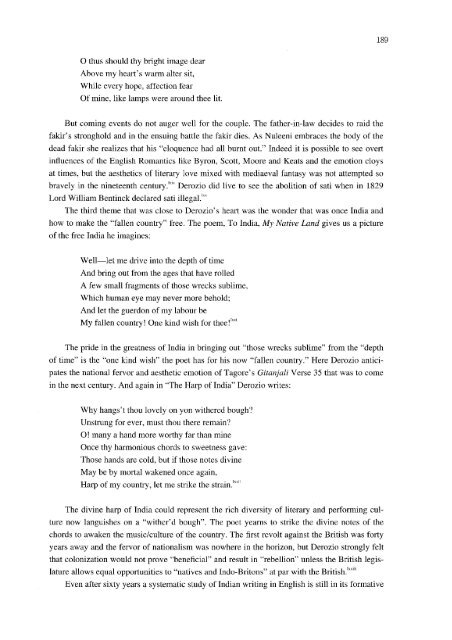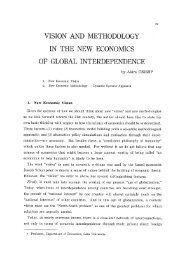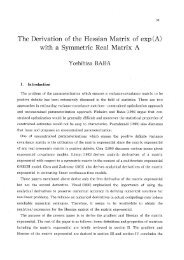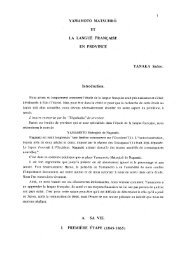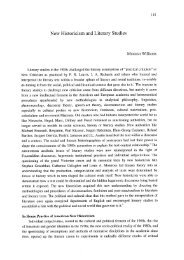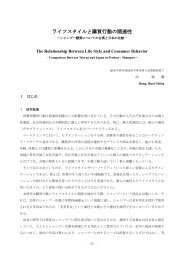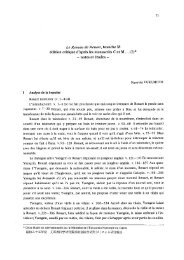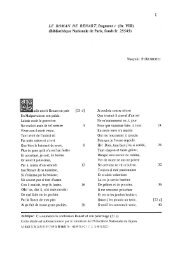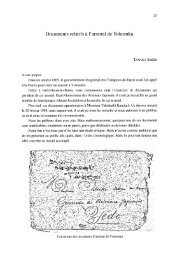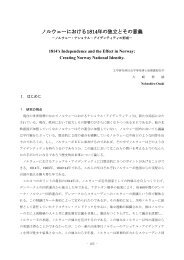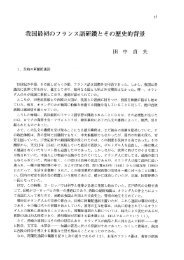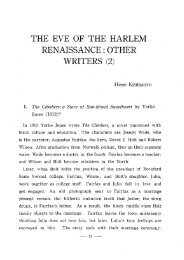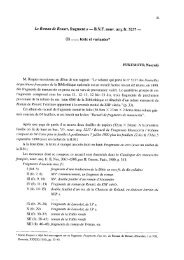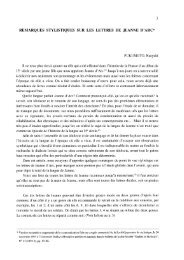Indian Writing in English 1794-2004 - Soka University Repository
Indian Writing in English 1794-2004 - Soka University Repository
Indian Writing in English 1794-2004 - Soka University Repository
Create successful ePaper yourself
Turn your PDF publications into a flip-book with our unique Google optimized e-Paper software.
O thus should thy bright image dear<br />
Above my heart's warm alter sit,<br />
While every hope, affection fear<br />
Of m<strong>in</strong>e, like lamps were around thee lit.<br />
But com<strong>in</strong>g events do not auger well for the couple. The father-<strong>in</strong>-law decides to raid the<br />
fakir's stronghold and <strong>in</strong> the ensu<strong>in</strong>g battle the fakir dies. As Nuleeni embraces the body of the<br />
dead fakir she realizes that his "eloquence had all burnt out." Indeed it is possible to see overt<br />
<strong>in</strong>fluences of the <strong>English</strong> Romantics like Byron, Scott, Moore and Keats and the emotion cloys<br />
at times, but the aesthetics of literary love mixed with mediaeval fantasy was not attempted so<br />
bravely <strong>in</strong> the n<strong>in</strong>eteenth century.'x`cDerozio did live to see the abolition of sati when <strong>in</strong> 1829<br />
Lord William Bent<strong>in</strong>ck declared sati illegal.'XX<br />
The third theme that was close to Derozio's heart was the wonder that was once India and<br />
how to make the "fallen country" free. The poem, To India, My Native Land gives us a picture<br />
of the free India he imag<strong>in</strong>es:<br />
Well—let me drive <strong>in</strong>to the depth of time<br />
And br<strong>in</strong>g out from the ages that have rolled<br />
A few small fragments of those wrecks sublime,<br />
Which human eye may never more behold;<br />
And let the guerdon of my labour be<br />
My fallen country! One k<strong>in</strong>d wish for thee!"<br />
The pride <strong>in</strong> the greatness of India <strong>in</strong> br<strong>in</strong>g<strong>in</strong>g out "those wrecks sublime" from the "depth<br />
of time" is the "one k<strong>in</strong>d wish" the poet has for his now "fallen country." Here Derozio antici-<br />
pates the national fervor and aesthetic emotion of Tagore's Gitanjali Verse 35 that was to come<br />
<strong>in</strong> the next century. And aga<strong>in</strong> <strong>in</strong> "The Harp of India" Derozio writes:<br />
Why hangs't thou lovely on yon withered bough?<br />
Unstrung for ever, must thou there rema<strong>in</strong>?<br />
0! many a hand more worthy far than m<strong>in</strong>e<br />
Once thy harmonious chords to sweetness gave:<br />
Those hands are cold, but if those notes div<strong>in</strong>e<br />
May be by mortal wakened once aga<strong>in</strong>,<br />
Harp of my country, let me strike the stra<strong>in</strong>:—<br />
The div<strong>in</strong>e harp of India could represent the rich diversity of literary and perform<strong>in</strong>g cul-<br />
ture now languishes on a "wither'd bough". The poet yearns to strike the div<strong>in</strong>e notes of the<br />
chords to awaken the music/culture of the country. The first revolt aga<strong>in</strong>st the British was forty<br />
years away and the fervor of nationalism was nowhere <strong>in</strong> the horizon, but Derozio strongly felt<br />
that colonization would not prove "beneficial" and result <strong>in</strong> "rebellion" unless the British legis-<br />
lature allows equal opportunities to "natives and Indo-Britons" at par with the British.'XX''<br />
Even after sixty years a systematic study of <strong>Indian</strong> writ<strong>in</strong>g <strong>in</strong> <strong>English</strong> is still <strong>in</strong> its formative<br />
189


